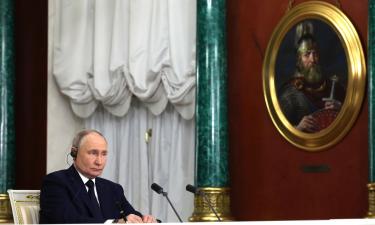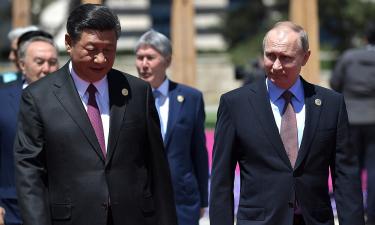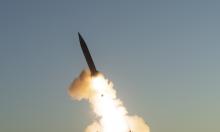Milosevic Update: Let's Fight Back!
Below is the full text of the ICDSM's motion, filed with The Hague Tribunal on 5 November by Nico Varkevisser.
The motion contains our proposals for solving the life-threatening health crisis brought on by the ICTY's abuse of Slobodan Milosevic.
For more on that, please see the article, "Hague Tries Quietly to Murder Milosevic; His Defense in Financial Crisis" at https://english.pravda.ru/news/russia/12379-n/
The Tribunal responded to our motion by fax. Their response will be posted some time later today, November 12th, at https://emperor.vwh.net/icdsm/more/it-122.htm
In their response, the ICTY stated that our motion did not follow proper procedures for applying for amicus status, as laid out in UN rule IT/122.
We were unable to find this rule IT/122 on the Website of the International Tribunal for Yugoslavia. Thus the ICTY has introduced a new legal concept, the non-public rule of procedure. This concept may be further developed by Mr. Franz Kafka.
In their communication, the ICTY fortunately included the text of the mysterious Rule 122. We have therefore written and submitted a second motion, which we will make available to you shortly.
During the proceedings on Monday, November 11th, the ICTY judges discussed with Mr. Milosevic, Prosecutor Carla del Ponte's motion to force unwanted counsel on the Yugoslav leader.
We will post a full report on that discussion. Suffice it to say, here, that the ICTY's argument is: Slobodan Milosevic is physically at risk because of the trial; therefore in his own interest he must be partly or entirely denied the right to defend himself. In other words, Mr. Milosevic, whose cardiac condition is affected by stress, is to be forced to sit and watch while his defense is mishandled.
The ICDSM has proposed an entirely different way to safeguard Milosevic's health. This is contained in the motion below. We are now trying to raise the funds needed to hold a press conference in The Hague, including a legal expert. If you can help financially, now is the time to do it. Donations can be made by going to https://emperor.vwh.net/icdsm/nowisthetime.htm
Jared Israel, ICDSM
***
Case No. IT-02-54-T
IN THE TRIAL CHAMBER
AMICUS CURIAE REQUEST
MOTION FOR URGENT SPECIALIZED MEDICAL ATTENTION AND PROVISIONAL RELEASE FOR SLOBODAN MILOSEVIC
To the Judges of Trial Chamber III of the International Tribunal;
The ICDSM (International Committee to Defend Slobodan Milosevic), a non-profit, non-governmental organisation, seeks leave to make submissions necessary for a proper determination of the case, pursuant to article 74 of the Rules of Procedure and Evidence of the ICTY;
This Chamber has already afforded amicus curiae status to outside counsel to assist it, stating that it has done so as a result of President Milosevic's written decision not to retain defence counsel, and with the objective of ensuring a fair trial as well as a proper determination of the case;1
The two remaining amici appointed by the Chamber have not adequately pursued the crucial issue of the accused's serious medical condition, nor have they secured the basic conditions and facilities required for the preparation of his defence;
Slobodan Milosevic is exercising his most fundamental right to defend himself in person, yet his health is threatened by the hectic trial schedule. He has been exhausted attempting to attain the "equality of arms" against a powerful prosecution determined to adduce vast quantities of documentation of all types, large portions of which are not relevant to specific counts in the indictments. On November 1st, 2002, Slobodan Milosevic suffered an episode of a rapid rise in blood pressure, due to his condition of malignant hypertension, which has been exacerbated by long days of hearings without appropriate rest, and accumulated months of hearings.
The ICDSM seeks leave to request this Trial Chamber to adjourn proceedings to provide Slobodan Milosevic with the specialized health care he requires. He should obtain this medical attention from practitioners familiar with his condition, in Belgrade. The ICDSM also requests that following Slobodan Milosevic's complete convalescence the Trial Chamber follow the medical recommendations provided to it by its own appointed medical practitioners. In addition, the ICDSM requests that the Trial Chamber order the provisional release of Slobodan Milosevic so that he may properly exercise his right to the equality of arms in the conditions and with the facilities required under international law. The provisional release requested would be for President Milosevic, subject to any conditions and guarantees deemed appropriate by the Trial Chamber, to be permitted to prepare his trial in a non-custodial residence in The Hague.
The facts
Mr. Milosevic is suffering from two significant medical conditions, malignant hypertension and angina pectoris, which have been brought to the Chamber's attention by a medical concilium having examined him by order of the Chamber itself. Malignant hypertension is aggravated by stress. Untreated, the mortality rate is elevated: only 25% of patients survive one year.2
The Chamber has ordered that Mr Milosevic be examined. The medical practitioners appointed accordingly provided the judges with conclusions and recommendations with respect to the deterioration of Mr. Milosevic's state of health as a result of the grueling trial schedule and exorbitant effort that he is obliged to provide in order to mount his defence.
The Trial Chamber then stated that it would not adopt the medical recommendations "literally", but rather, " as far as the spirit is concerned".3 In reality, however, the trial schedule has remained generally long, hectic, and exhausting for Slobodan Milosevic.
In fact, pressure on the defendant had recently increased. Until the Chamber's announcement that Slobodan Milosevic had complained of exhaustion, the Chamber now frequently sat for full days, having abandoned its previous practice, following Mr. Milosevic's illness, of sitting for shorter half-day sessions. Mr. Milosevic was spending his lunch break in a basement with access to a sandwich for nourishment. It would have been impossible to argue that Slobodan Milosevic was receiving a treatment in any way compatible to the "spirit" of medical recommendations made to this Chamber.
The "spirit" of the medical recommendations made to the Chamber, it is submitted, was to reduce the stress and strain incurred by Mr. Milosevic as a result of his overwhelming efforts to prepare and face a trial of exceptional magnitude. To have skirted the medical recommendations was to ignore rather than adopt their "spirit", to have continued hearings at the previous rhythm threatened Slobodan Milosevic's life.
The Chamber did not consider itself bound to adopt the medical recommendations made with respect to a potentially fatal medical condition, and the inevitable occurred: Slobodan Milosevic was pushed to the limit of exhaustion.
Slobodan Milosevic has received over 100 000 pages of documents and 600 videocassettes from the Prosecutor as disclosure of evidence pursuant to the relevant provisions of the Rules. Given the massive disclosure of evidence received by Mr Milosevic, he is now under more strain than he was when the medical recommendations were made.
For instance, on several trial days, Mr. Milosevic has had to choose between walking outside for fresh air or eating a meal. Whatever option Slobodan Milosevic chooses will be detrimental: he will attempt to prepare his trial without having eaten, or he will prepare it without a minimum of fresh air. Either way his rights are violated. This astonishing state of affairs presents a serious threat to his health, and increases his level of stress, which is a trigger of his heart condition.
Mr Milosevic has yet to receive specialized cardiovascular care, which he requires. The Freedom Association has previously filed a medical report from Mr. Milosevic's personal physician, Colonel Zdravko M. Mijailovic, MD, PhD, who was allowed to observe the examinations of the ICTY-appointed medical practitioners. Dr Mijailovic stated that Mr. Milosevic's condition of arterial hypertension exponentially increased the "risk of fatal incidents (brain stroke, acute myocardial infarct (sic), hear (sic) arrest, …)". Dr Mijailovic further recommended a number a number of specialized interventions and examinations to attempt a stabilization of Mr. Milosevic's condition.
Argument
If Slobodan Milosevic's trial and prison conditions remain unchanged, there is a real likelihood of fatality. Denial of medical care is a violation of the International Covenant on Civil and Political Rights and may constitute torture.4 Hearings have been suspended since November 1st 2002, so that parties may provide recommendations to the Chamber with respect to the continuation of the proceedings.
In the instant case, a medical opinion has been requested by, and submitted to the Chamber several months ago. The right to medical attention enshrined by international human rights instruments5 is a hollow right indeed if medical recommendations are not followed by the judicial authority. It is tantamount to affording no right to medical care at all.
It is not for the judicial authorities to re-evaluate, modify, or otherwise tailor medical recommendations to other preoccupations, such as the trial schedule. The accused, under international law, has an actual right to appropriate, specialized medical care, not only, it is submitted, the right to a court-ordered medical examination that a judicial authority can choose to ignore.
Slobodan Milosevic must receive immediate comprehensive medical care and attention, preferably from medical practitioners familiar with his condition over the years. Only they are in a position, it is submitted, to adequately evaluate his present state, based on known antecedents. Medical evaluation and care provided by professionals conversant with the patient's condition over the years is a more efficient and effective than submitting Mr Milosevic to examinations by medical personnel ignorant of the previous manifestations and general evolution of his condition.
President Milosevic should be released to the Belgrade for this purpose.
Right to defend himself in person with adequate facilities
The ICDSM submits that the denial of adequate facilities has been a significantly aggravating factor in Slobodan Milosevic's condition of exhaustion and potentially fatal hypertension. In addition to requesting an adjournment of these proceedings so that the defendant can be treated, appropriately, by physicians familiar with his condition, the ICDSM requests that following the defendant's convalescence, he be afforded conditions in which he may prepare his defence in a manner compatible with international human rights instruments and guarantees.
Slobodan Milosevic is defending himself, which is his fundamental right under the Tribunal's Statute, as well as under the International Covenant for Civil and Political Rights.6 This right is no less a cornerstone of international human rights guarantees, it is submitted, than the right to be represented by counsel of choice.
This Chamber, in rendering decisions with respect to the provision of amici curiae, provisional release, as well as an order concerning practical facilities to the accused, has acknowledged Mr. Milosevic's rights to adequate time and facilities to prepare his defence.7
Although these rights have been acknowledged, they have not, in the circumstances, been respected to the extent required by the sheer complexity and breadth of the case against Mr. Milosevic. He is simply not in a position to adequately prepare his defence in a custodial setting. The stringent rules and security protocols of the United Nations detention unit do not permit the accused sufficient time or adequate circumstances to discuss his defence with his legal assistants. He is subject to a prison schedule that not only is detrimental to his health, but is inconsistent with the preparation of a massive criminal trial, one that has grown to include two new indictments since it began. With respect to the new indictments, it is worth mentioning that they cover subect matter from a decade ago. The Prosecutor, with years of preparation, is at a disproportionate advantage.
The Chamber's March 7th 2002 Order to the Registry to Provide Report Concerning Practical Facilities Available to the Accused has brought no significant improvement to the inadequate facilities offered to Mr Milosevic to prepare his trial. Although he now has legal assistants, his right to contact them is limited. In addition, he has received quantities of documentation of every imaginable type; he is in no position, in the regimented custodial context, to analyse them all, discuss with his legal assistants, and rest as he needs to avoid a potentially fatal cardiac episode. The prison schedule and context simply do not permit it.
Provisional Release
This Chamber has denied a request for the provisional release of Mr. Milosevic on March 6th 2002.8 It is now submitted that the request presented by the amici curiae for provisional release was inadequately argued then, and that new facts and law should be considered by this Chamber.
The Chamber denied the request for provisional release for three reasons:
1. Mr. Milosevic's right to have adequate time and facilities for the preparation of his defence may be safeguarded by means other than provisional release;
2. That the trial has commenced;
3. That the Chamber was not satisfied that the accused, if released, would continue to appear for trial and would not pose a danger to any victim, witness or other person.9
The arguments raised by the amici in support of their request for provisional release only take up four (4) transcript pages10, and include the following remark:
"So I'm not insisting on provisional release right now and the equality of arms, so to speak, but the Trial Chamber should simply find ways and means of enabling Slobodan Milosevic, since he is unrepresented anyway, to prepare properly for every day in court."11 In light of this comment, it cannot be said that the amici provided the Chamber with the proper guidance concerning the facts and the law to the support the request for provisional release made by Mr. Milosevic.
It is submitted that, although accommodations have been made to provide some facilities to Mr. Milosevic, these are at present woefully inadequate. Although Mr. Milosevic may have the benefit of legal assistants, if he cannot meet with them for sufficient time to prepare his defence, his rights to a fair trial and to the equality of arms are not safeguarded. If Mr. Milosevic is forced to choose between getting a few minutes of fresh air and eating a meal, his rights to be treated in accordance with the presumption of innocence12 are also not respected.
Attempts have been made to provide Slobodan Milosevic with facilities for the preparation of his defence by means other than provisional release. These facilities are inadequate. The Statute of this Tribunal provides, as a minimum right, that of "adequate time and facilities for the preparation" of his defence.13
It may be that security concerns and detention facility protocol are incompatible with the type of facilities and flexible visiting time required to prepare the defence of Mr. Milosevic. If that is the case, only provisional release, subject to appropriate safeguards and guarantees, can afford a fair trial in this case.
The fact that this trial has commenced does not bar provisional release.14 Given Slobodan Milosevic's state of health and very real risk of fatality if he is to endure constant strain, consideration must be given to granting him the right to adequately prepare his defence in a non-custodial setting, in which he will be free to meet his legal assistants and set his own schedule so as not to have to choose between fresh air and food, which would be a minimum prerequisite for the preparation of his trial.
Provisional release, or more precisely an adjustment in detention conditions, would be possible within the city of The Hague. President Milosevic has asserted that he would not flee, that he wishes to face the injustice visited upon him and his people15 by this Tribunal. Although Mr. Milosevic did not voluntarily surrender to the Tribunal, he has never fled. Mr. Milosevic has only raised legal challenges and asserted his rights to the full extent of domestic and international law.
It is submitted that a security arrangement could easily be set, within The Hague, that would address any potential concerns with respect to the safety of Prosecution witnesses. There is no way that the defendant could directly, or indirectly, influence witnesses who reside in another country.
The Chamber does not have to wait for Mr. Milosevic's health to significantly deteriorate, or for him to have a potentially fatal cardiac episode or stroke before adjusting his conditions of detention in order to safeguard both his life and right to a fair trial. As stated by Chamber II of the ICTY in Talic16:
" It would be inappropriate for this Trial Chamber to wait until Talic is on the verge of death before considering favourably his application for provisional release and in the meantime allow a situation to develop which would amount to what is described in the Mousiel decision supra as being an inhumane one. This is all the more so when, as stated earlier, detention on remand is not meant to serve as punishment but only as a means to ensure the presence of the accused for the trial."
It is now submitted that a potentially inhumane situation has developed. The defendant has a potentially fatal medical condition which has deteriorated as a result of strain and stress incurred by the length of proceedings as well as inadequate facilities. This Chamber has been made aware of the defendant's condition. The ICDSM submits that this Chamber can and must act before it is too late.
The ICDSM asks this Chamber to:
GRANT it amicus curiae status;
GRANT an immediate adjournment of the trial for medical examinations and specialized treatment under the care and supervision of President Milosevic's personal physician, Colonel Zdravko M. Mijailovic, MD, PhD in Belgrade and any other specialist chosen by the defendant or his practitioners;
AFFORD Slobodan Milosevic with the specialized medical care he requires;
GRANT an additonal adjournment for the complete recovery of the defendant under medical supervision and care;
APPLY, with immediate effect, all medical recommendations with respect to the trial schedule;
GRANT provisional release to the defendant, Slobodan Milosevic, following his convalescence, subject to such conditions or guarantees as may be deemed appropriate; OR
VARY the conditions of detention of the accused, Slobodan Milosevic, following his convalescence, to a non-custodial setting in The Hague, with such security, conditions or guarantees as deemed appropriate.
Done this 5 November 2002, in Amsterdam, The Netherlands
Nico Varkevisser Vice-Chairman
For the ICDSM
1 Prosecutor v. Milosevic, Case No. IT-02-54-T, Order Inviting Designation of Amicus Curiae, 30 August, 2001.
2 Medical Report, March 25th, 2002, Professors Bojic, Suvakovic and Janicijevic, filed by Freedom Association, March 30th, 2002
3 Prosecutor v. Milosevic, Case No. IT-02-54-T, English-language transcripts, August 28th, 2002, p. 9042, lines 2-3.
4 Sendic v. Uruguay (Communication No. R. 14/63) United Nations, Human Rights Committee, 28 October 1981, ILR, vol. 69, 183, 193.
5 Standard Minimum Rules for the Treatment of Prisoners, (First United Nations Congress on the Prevention of Crime and the Treatment of Offenders: Report by the Secretariat) Annex I.A, Rule 22 (2): "Sick prisoners who require specialist treatment shall be transferred to specialized institutions or to civil hospitals. (&)"; Basic Principles on the Treatment of Prisoners, Principle 9: "Prisoners shall have access to the health services available in the country without discrimination on the grounds of their legal situation." Body of Principles for the protection of All Persons under any Form of Detention or Imprisonment, Principle 25, affords the right to a second medical examination or opinion. The ICTY Rules for Detention, at Rules 29 and 30, provide the right to medical attention.
6 Statute of the ICTY, article 21 (4) (d); International Covenant on Civil and Political Rights, art. 14 (3) (d))
7 Order Inviting designation of Amicus Curiae, supra, note 1; Decision on Accused's Application for Provisional Release, 6 March 2002; Order to Registry to Provide Report Concerning Practical Facilities Available to Accused, 7 March 2002.
8 Decision on Accused's Application for Provisional Release, Case No.: IT-02-54-T, 6th March 2002.
9 Id., p. 2.
10 IT-02-54-T, English language transcripts, February 27th, 2002, pages 1132 to 1136.
11 Id., p. 1133, lines 20 to 24.
12 ICTY Rules of Detention, Rule 5.
13 Statute, Article 21 (4) (d). See also International Covenant for Civil and Political Rights, article 14 (4) (d).
14 Prosecutor v. Brdjanin and Talic, Case No. IT-99-36-T, Decision on the Motion for Provisional Release of the Accused Momir Talic, 20 September 2002.
15 Transcripts, supra, note 5, page 1136, lines 9-12.
16 Supra, note 11.
Subscribe to Pravda.Ru Telegram channel, Facebook, RSS!




